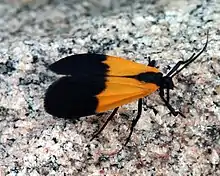| Lycomorpha pholus | |
|---|---|
 | |
| Scientific classification | |
| Domain: | Eukaryota |
| Kingdom: | Animalia |
| Phylum: | Arthropoda |
| Class: | Insecta |
| Order: | Lepidoptera |
| Superfamily: | Noctuoidea |
| Family: | Erebidae |
| Subfamily: | Arctiinae |
| Genus: | Lycomorpha |
| Species: | L. pholus |
| Binomial name | |
| Lycomorpha pholus | |
| Synonyms | |
| |
Lycomorpha pholus, the black-and-yellow lichen moth, is a moth in the family Erebidae. It is found in North America from Nova Scotia to North Carolina, west to South Dakota and Texas.[2] The habitat consists of short-grass prairie.[3]
The wingspan is 25–32 mm. Adults have bluish-black wings, with a yellow, orange or red basal area and black distal area. Adults are on wing from July to September. They fly during the day and are attracted to flowers, including goldenrod. The adults are thought to mimic poisonous Lycid beetles, such as Calopteron species.
The larvae feed on lichen and resemble their host. The species may take several years to develop, depending on the location. Pupation takes place in hairy cocoons attached to rocks or tree trunks near the host.[4]
Subspecies
- Lycomorpha pholus pholus
- Lycomorpha pholus miniata Packard, 1872 (central North American)
References
- ↑ mothphotographersgroup
- ↑ Butterflies and Moths of North America
- ↑ Robinson, E. & Schmidt, B. C. "Species Details: Lycomorpha pholus". University of Alberta Museums. E.H. Strickland Entomological Museum. Retrieved December 27, 2020.
- ↑ Bug Guide